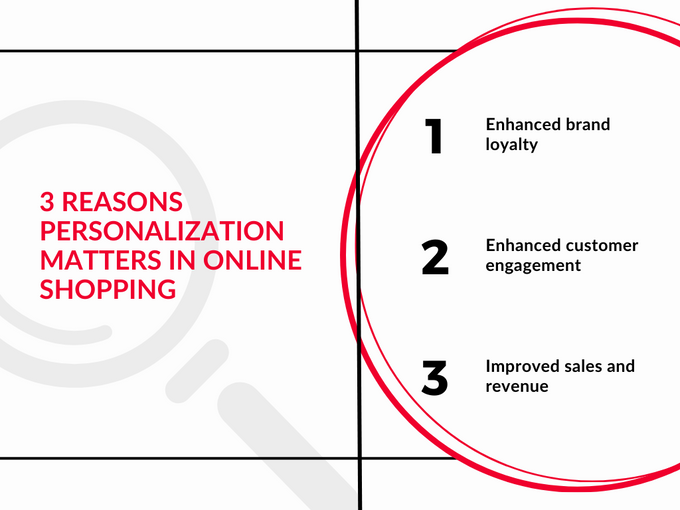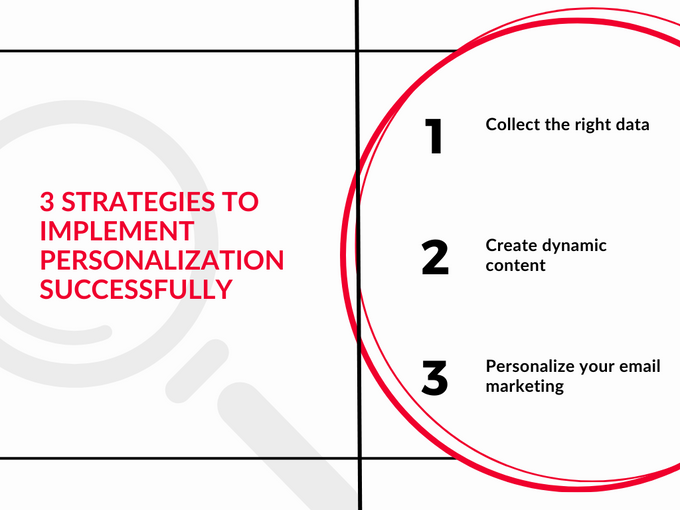Personalization in Online Shopping: Why It Matters
Personalization has never been more popular, but why is it important for your eCommerce store?
Updated November 19, 2024

There’s more to personalization than putting your customer's name in a marketing email. When it comes to eCommerce, making things feel unique to each visitor results in better and more frequent sales.
Over 90% of customers are more likely to shop with brands that offer relevant product recommendations. Using personalization tactics, you can show customers what they want to see, when they want to see it.
We'll take a closer look at what personalization in online shopping is before getting into why it's essential. And we'll show you three ways you can implement it successfully.
» Find out how eCommerce personalization helps your business
Meet the Expert
Sandra Stepan, co-founder of SnapAdvantage, has 10 years in digital marketing, focusing on e-commerce expansion. With success in building 7-figure brands, she amplifies growth for top brands. An industry leader, Sandra is a trusted expert for marketing excellence.
What is Personalization in Online Shopping
Personalization in online shopping is all about creating a unique and relevant experience just for your customers. You tailor their user experience based on their unique preferences, behaviors, and history.
We do this by collecting information about customers' browsing history, past purchases, demographics, and even location. Based on these insights and using technology, we can show customers:
- Tailored suggestions: Relevant product recommendations instead of generic browsing.
- Special offers and deals: Personalized discounts and promotions on products your customers might be interested in.
- Customized user interfaces: User-friendly, intuitive layout, design, and website content based on the user's preferences and behaviors.
- Content and marketing: Targeted blog posts (using relevant keywords), ads, and emails that speak to their specific needs and desires.
» Not sure what to customize? Here are the elements you should personalize in your eCommerce store
3 Reasons eCommerce Personalization Matters
Personalization directly impacts the quality of user experience. By tailoring product recommendations, search results, homepages, and even promotional banners to individual preferences, online stores make the shopping experience more efficient and enjoyable.
For you, as an eCommerce merchant, personalization in online shopping matters because you're giving your customers more chances to find and buy the things they actually want. » Find out more about visual merchandising
1. Enhanced Brand Loyalty
Personalized experiences are more likely to keep customers coming back, reducing churn and acquisition costs. By understanding individual customer needs and preferences, you can proactively address potential concerns and foster long-term loyalty.
» Growing your store? Steer clear of eCommerce errors that damage brand loyalty
2. Enhanced Customer Engagement
In online shopping, personalization isn't just about making customers feel good; it's about making their shopping experience easier and more efficient. By streamlining the process with personalized product recommendations and intuitive internal search engines, you remove friction and frustration.
And when customers feel like they're getting a personalized experience, they're more likely to interact with the website and explore different products. This increased engagement can translate into greater brand awareness and customer lifetime value.
3. Improved Sales and Revenue
By delivering the right products to the right people at the right time, eCommerce personalization directly drives sales and revenue. A personalized experience can even lead to larger basket sizes, as customers discover additional items they might be interested in.
» Want to increase revenue even more? Check out how to maximize sales with search
3 Strategies to Implement Personalization Successfully
1. Collect the Right Data
Personalization starts with data. And it's important to collect your customer data ethically. First-party data—the information you get directly from online shoppers—includes information your customers agree to provide. This could be emails, wishlist items, and names. This kind of data often comes from registration or opt-in forms on your site.
First-party data also includes session-related analytics like location, conversions, clicks, product interactions, and abandoned carts. You can often get this level of information from the analytics section of Shopify, WooCommerce, and Magneto.
Once you've collected data, analyze and segment your audience to understand individual customer preferences and behavior. This allows you to create personalized experiences that are tailored to each customer's needs and interests.
The key to effective data collection is transparency and user trust. Be clear about what data you're collecting, how you'll use it, and how users can control their privacy settings.
» Need help with data? Check out these essential customer segmentation strategies
2. Create Dynamic Content
Dynamic content is any online or digital content that changes based on predefined factors. This could be the time of day your visitor arrives on your page or their browsing history. It's unlike static content, which remains the same for all users.
How you implement dynamic content sections depends on what platform or CMS you are using. Often, you'll need to integrate machine learning and AI-driven solutions, which can analyze this customer data to recommend relevant products, offers, and content in real time.
Pro tip: remember, balance is key. Customers are three times as likely to abandon brands that excessively personalize, compared to those that don’t personalize at all. So keep your personalization efforts grounded in your customers' needs and make it easy with a dedicated personalization solution.
» Here's a simple guide on how to personalize your landing page
3. Personalize Your Email Marketing
Another way to utilize data collection is by sending tailored emails based on past purchases, browsing history, and segmented data.
Keep in mind that not all website visitors will make immediate purchases. Including personalized email marketing (or even email remarketing) into your strategy nurtures leads over time.
eCommerce Personalization: A Balancing Act
Amazon uses complex algorithms to provide personalized product suggestions based on customer interactions. Netflix is known for its recommended content based on users' viewing history.
Today, there's no reason why you can't keep up with these big names with your own personalization strategy. Personalization matters because it makes your visitors' experience better.
» Anticipate your customers' needs with predictive personalization







